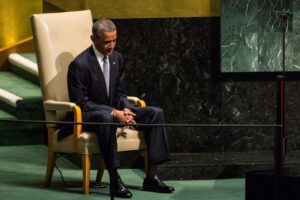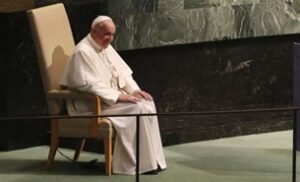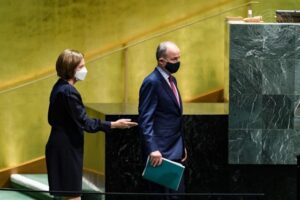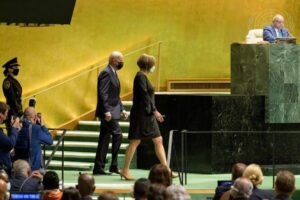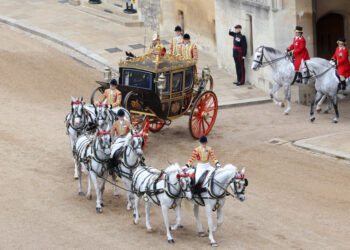Para leer el artículo en español, clicar aquí
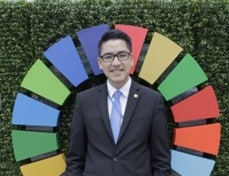 As the World Protocol Magazine Editorial Board, we take enormous pride in keeping this platform open to all experts from the numerous fields of business and protocol: Mr. Herrera is an International Relations professional who has worked with highly ranked diplomats worldwide. He’s an International Relations graduate with Honours and has nine years of professional experience representing Government interests in bilateral and multilateral fora. When starting his professional career, he joined the Protocol Branch at the Ministry of Foreign Affairs. Through his course, he developed a passionate interest in State Protocol and Ceremonial Affairs; he never stopped expanding his knowledge on the matter. He has served as Deputy Head of Mission in Canberra, Australia, and currently is a diplomat posted in New York; where he witnesses how Protocol is a vital component of how Diplomacy works at the United Nations. His expertise has taken him to work in multiple settings and locations, including Kenya and Bhutan. In acknowledgment of his skills, he has been invited as a panellist, speaker, and moderator in different workshops, seminars, and forums on various topics. He aims to use his untiring commitment and drive to bring cutting-edge Protocol and Ceremonial strategies and implement innovative campaigns that accelerate growth and maximize the deliverance of High-Level Diplomacy through Protocol. In his second article published by WPM he shares his views ont he 77th UN General Assembly.
As the World Protocol Magazine Editorial Board, we take enormous pride in keeping this platform open to all experts from the numerous fields of business and protocol: Mr. Herrera is an International Relations professional who has worked with highly ranked diplomats worldwide. He’s an International Relations graduate with Honours and has nine years of professional experience representing Government interests in bilateral and multilateral fora. When starting his professional career, he joined the Protocol Branch at the Ministry of Foreign Affairs. Through his course, he developed a passionate interest in State Protocol and Ceremonial Affairs; he never stopped expanding his knowledge on the matter. He has served as Deputy Head of Mission in Canberra, Australia, and currently is a diplomat posted in New York; where he witnesses how Protocol is a vital component of how Diplomacy works at the United Nations. His expertise has taken him to work in multiple settings and locations, including Kenya and Bhutan. In acknowledgment of his skills, he has been invited as a panellist, speaker, and moderator in different workshops, seminars, and forums on various topics. He aims to use his untiring commitment and drive to bring cutting-edge Protocol and Ceremonial strategies and implement innovative campaigns that accelerate growth and maximize the deliverance of High-Level Diplomacy through Protocol. In his second article published by WPM he shares his views ont he 77th UN General Assembly.
As we are just a few days away from the opening of the 77th session of the UN General Assembly, the United Nations diplomatic community is preparing for the most significant diplomatic event in the world: the general debate of the United Nations assembly; and with it, the annual arrival of Heads of State and Government from around the world after two years of hybrid sessions caused by the COVID-19 pandemic.
This year’s “UNGA” (in its 77th edition) is entitled “A decisive moment: transformative solutions for intertwined challenges,” promoted by the president-elect for this session, the director of environmental sustainability of the Office of the President of Hungary, Csaba Kőrösi. The title could not be more accurate: the COVID-19 pandemic that persists in our current reality permeated a before and after in how multilateral diplomacy is carried out more than two years later, and everyone had to adapt to new ways of life. Diplomacy was no exception to this evolution.
In this article, we will review the main changes the team of the protocol and liaison service office of the United Nations had to make during the general debate of the 2020 and 2021 assemblies to lay the foundations for the – new – diplomatic practices that would guide the protocol of one of the most important and recognized political events worldwide, not only because of its impact on the lives of people around the world but also because of the expectation generated by bringing together the leaders of so many countries under the same roof.
Let’s start with the basics: the General Assembly is the main governing body of the United Nations. It meets in ordinary sessions once a year, from September to December at its headquarters in New York, with the general debate (the one attended by heads of state or government or their delegates) during the third week of September to give their position on global events and their vision on how to address them. Its development is regulated and despite this, it is often remembered more when one of these leaders goes out of the script or breaks the protocol.
Unlike the 2020 general debate, when the session was held almost entirely virtually due to the pandemic, in its 2021 edition, more than a hundred leaders and high-level representatives delivered their speeches in person. However, certain security restrictions established in 2020 remained in force for 2021 and to some extent, they were confusing: the mandatory use of masks, keeping capacity to a minimum in meeting rooms and social distancing, and even the dilemma of how to prevent unvaccinated people entered the venue, trusting in the good faith of the delegations that would make a trip to the city that was the epicenter of covid-19 infections during the worst part of the pandemic.
The podium
| 2020 | 2021 |
| Traditionally, and before the COVID-19 pandemic, the precedency of the podium was taken by 3 High-Level officials:
1. The current President of the General Assembly (PGA) (center) 2. The UN Secretary-General (SG) (to the right of the PGA) 3. The Secretariat Officer, whose job it is to assist in moderating the general debate to the PGA and the SG (to the left of the PGA) Due to the coronavirus pandemic and security measures to prevent its spread, it was decided that for the 75th session, only the President of the General Assembly (PGA) would be located to the right of the podium, and to his left, the Secretary-General. |
Once the vaccination rate in New York State was increased and, in turn, the risk of contagion decreased for a new session of the General Assembly in September 2021, the three-chair podium returned, headed by the President of the General Assembly on duty, followed by the Secretary-General and the official Secretary.
Masks continued to be worn at all times for meetings, and only the speaker on duty could remove the mask while speaking and then put the mask back on for security measures. |
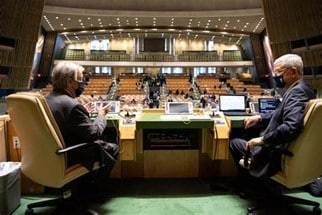 The Secretary General of the UN, Antonio Guterres (left), and the President of the General Assembly of the 75th Session, Volkan Bozkir (from Turkey) The Secretary General of the UN, Antonio Guterres (left), and the President of the General Assembly of the 75th Session, Volkan Bozkir (from Turkey) |
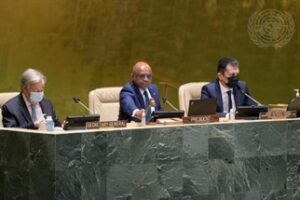 From left to right: Antonio Guterres, Abdullah Shahid (Maldives), President of the 76th Session, and the Assistant Secretary for Conference Management. From left to right: Antonio Guterres, Abdullah Shahid (Maldives), President of the 76th Session, and the Assistant Secretary for Conference Management.
|
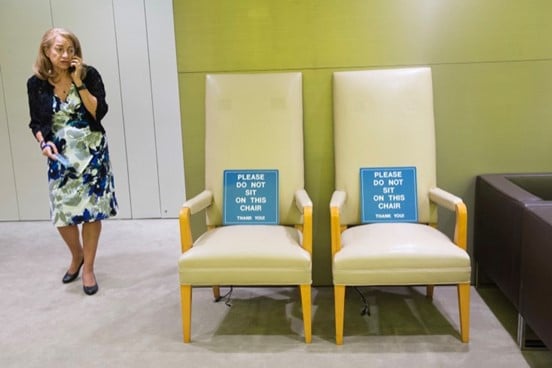 The ceremonial chair
The ceremonial chair
The Department of Protocol of the United Nations, within its procedures, has contemplated that a chair of honor or ceremonial chair be placed as a courtesy exclusively for the use of Heads of State or Government and special guests that, due to their rank this distinction is recognized, which is used when they visit and address the Plenary of the General Assembly.
Likewise, during the general debate, seats are reserved in the VIP area of the General Assembly Hall for the spouses of the Heads of State or Government, Vice Presidents, Crown Princes or Princesses who participate in the general debate, provided when the Head of Protocol is notified in advance of their attendance at the session.
As part of the adaptation due to the pandemic, in 2020, it was encouraged to participate in an arrangement in which speakers could send their messages in a pre-recorded format to broadcast them on the screens of the General Assembly Hall to reduce the number of people concentrated in a single room. Although it was not an ultimately successful measure (although it was replicated for 2021), since there were leaders who did not miss making their speech from the Hall, instead of waiting in the chair of honor for the President of the Assembly General proceeded to invite them to address at the podium, after they were asked to enter the Hall, they had to wait briefly standing to proceed, after the indication of the UN Head of Protocol, to go to the podium with their speech.
Heads of State entering the General Assembly Hall, escorted by the UN Protocol service during the 2021 General Debate
The UN Honor Guard
As mentioned earlier, during 2020 (and less frequently in 2021), the leaders of the UN Member States sent their interventions by pre-recorded videos for projection in the General Assembly Hall as a measure to prevent the spread of the virus if they were making the trip to New York. This city was the epicenter of the covid-19 pandemic in the United States in 2020. However, this was transformed into a response adapted to the current reality: the holding of hybrid events in virtual and face-to-face formats. Given this, the UN protocol department chose to grant the same courtesy of the Guard of Honor to the Heads of State and Government, even when their interventions were in pre-recorded format and they were not physically in the General Assembly Hall, which denoted the high capacity for adaptation and response to the numerous virtual interventions granted.
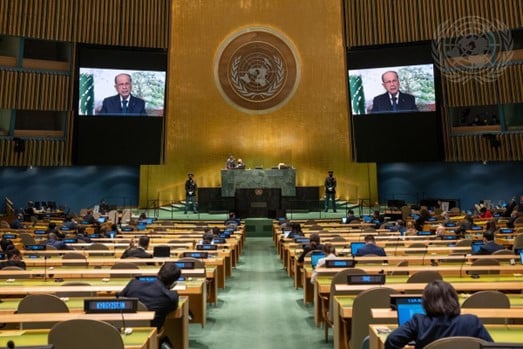 The President of Lebanon addresses the General Assembly via pre-recorded message during the General Debate of the 76th session. The United Nations Honor Guard provides the corresponding honors.
The President of Lebanon addresses the General Assembly via pre-recorded message during the General Debate of the 76th session. The United Nations Honor Guard provides the corresponding honors.
Changes: temporary or permanent?
There is no doubt that the covid-19 pandemic brought about a radical change throughout the world, from our jobs to interactions and social customs that we considered “normal”. For the United Nations, it was no exception. The eyes of the world turned once again to that podium, a symbol of multilateralism, to listen to the leaders of all countries on how to move forward together facing the main global challenges.
Reductions in the number of people allowed in meeting rooms, recommendations not to travel to New York if there was a high rate of covid-19 infection in their countries of origin, and reducing operations and events to the minimum necessary, were some of the measures that were taken and carried out to minimize the possible impact of contagion during the development of the general debate, which, at the gates of its 77th edition, raises the question of what changes will we see when we are overcoming a pandemic, but its effects are still with us, along with the other global challenges?
The physical controversy was discussed in the preparations for the High Level Week 2021: How to access the Summit in times of limitations?
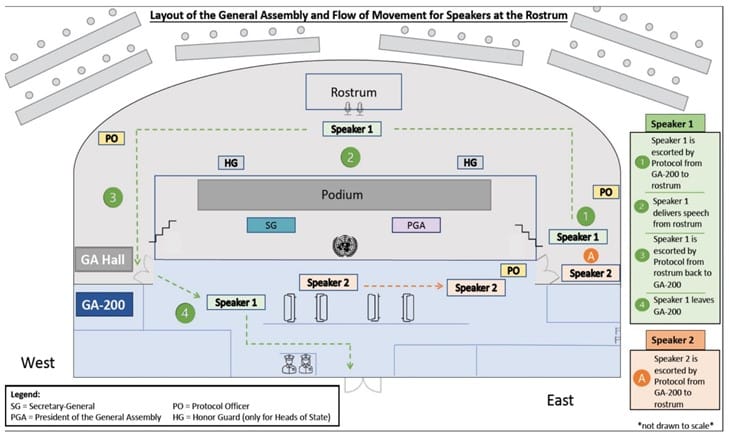
Representation of the flow of movements to the General Assembly Hall for speakers during the 2021 general debate
All travelers arriving in the United States were required to show negative Covid-19 proof. Still, the fact that vaccines were in such short supply in much of the world raised the possibility that many delegations were left unprotected and that a spread within the facilities of the UN was inevitable.
The Biden Administration tried to dissuade countries from attending the meeting in 2021, advocating remote interventions, but since the UN building is considered international or extraterritorial territory, it was decided that a vaccination test would not be required to enter, only a declaration that you are not a carrier of the coronavirus.
It was also forced to wear masks and maintain social distancing, a maximum of seven people per delegation in the UN compound, four in the General Assembly amphitheater, and reduced bilateral meetings to a minimum.
Now I ask you: What changes will there be at the protocol level for this session, or what changes would you like to see compared to past general assemblies?


